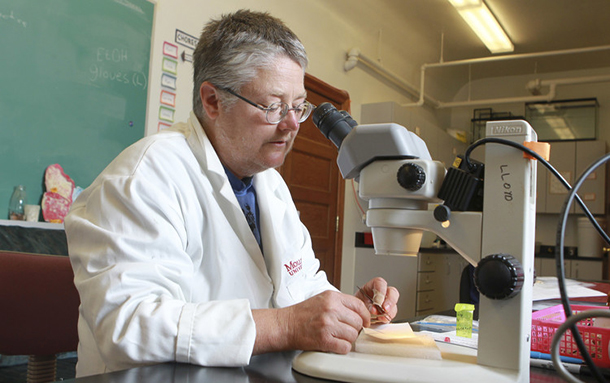- May 22, 2019
- Applied Research
- Comments : 0
Talking Ticks and Lyme Disease Testing with Dr. Vett Lloyd
One of the core pieces of our mission is supporting innovative research being done by researchers around New Brunswick. These research projects show us the potential of new and exciting technologies; allow us to imagine new uses for existing procedures and materials; inspire commercial products that make our lives easier and more fulfilling; and teach us incredible things about the world in which we live.
We’ll be dedicating a series of posts over the next few months to researchers whose names we think everyone in this province should know. New Brunswick is a hotbed of research – it’s time to tell some of those stories!
Most researchers are inspired to specialize in a particular field by a fascinating graduate course, an inspiring professor or a promising lab test. Dr. Vett Lloyd has a slightly more unique reason for devoting a large portion of her career to the study of Lyme disease: she was actually diagnosed with it.
A geneticist by training, with an MSc-equivalent degree from the University of Geneva and a doctorate from the University of British Columbia, Dr. Lloyd was in her garden one day when she was bitten by a tick. Lyme disease is spread by certain species of ticks through the transfer of a class of bacteria called Borrelia.
“I did exactly what you’re supposed to do [after a tick bite], but I still ended up experiencing some pretty bad symptoms and getting Lyme disease,” remembers Dr. Lloyd. “That was what really spurred my interest – biological understanding leads to better public knowledge, so I figured I would do a short summer project on ticks and Lyme disease and that would be that.”
Needless to say, the project ended up lasting more than the summer. A decade into Dr. Lloyd’s study of ticks, Lyme disease and other related tick-borne diseases have ended up tremendously influencing her research and professorship at Mt. Allison University. In exploring these diseases from a biological perspective, Dr. Lloyd has seen how they are capable of disrupting vitality and health in wildlife, domestic animals and humans. She explains that one of the main thrusts of her research is improving the effectiveness of diagnostic blood tests for tick-vectored diseases.
“These diseases, and Lyme disease in particular, are tough for physicians to diagnose because the existing tests rely on the body producing antibodies against the disease. If a person is very ill or on some medications, they may not produce enough antibodies to be detected by the standard blood tests,” she says.
This makes the illnesses themselves much more difficult for medical professionals to deal with. As Dr. Lloyd continues, “not only is the bacteria complex and good at hiding in the body where it is protected from the immune system, it can even suppress the immune system and tolerate certain antibiotics. And if that’s not bad enough, proteins within the bacteria mimic some human proteins that occur naturally within the body. This behavior is called molecular mimicry, and it can actually trigger autoimmune diseases.”
Needless to say, Lyme disease can be a handful, which is part of why Dr. Lloyd thinks the current state of awareness about the diseases that ticks carry is unacceptable. Ticks are becoming much more common in Canada due to climate change. Cases of Lyme disease have skyrocketed from only 144 confirmed in 2009 to a whopping 992 in 2016, and the disease is continuing to gain ground as Borrelia ticks spread north into New Brunswick and west into prairie provinces like Saskatchewan. That’s bad news to Dr. Lloyd, so she’s been busy working in collaboration with other researchers to change the narrative and improve the tools available to the people and physicians dealing with these diseases.
“We’ve created a Lyme disease research network at Mt. A, composed of a multidisciplinary group of faculty members. We’ve got people with a wide range of expertise, including a geographer for ecosystem modeling, a psychologist studying the social consequences of the disease, a political scientist thinking about policy barriers to accessing healthcare, chemists looking for novel anti-microbials and many more people with valuable expertise,” Dr. Lloyd says. “But most importantly, we have good relations with the patient community so that we can work in partnership with patients to make things better. It’s really helpful to have these collaborations between all of us, so we can share resources, ideas and information and new information is immediately translated to the patient community.”
This research network, along with participation in national and international Lyme disease research networks, has helped Dr. Lloyd transcend the typical limits of biological research. Programs like her tick testing initiative, where people across Canada can send ticks to Dr. Lloyd’s lab to be identified and tested for Lyme disease strains, are helping to narrow the gap between scientists and the general public.
“Science is rapidly changing – we know new things now that we didn’t ten years ago,” Dr. Lloyd says. “That’s why it’s so important to engage community groups, nature groups, outdoor workers, municipal leaders and everyone else. People need to know this information.”
Her experiences both in and out of the lab have often brought Dr. Lloyd into contact with the NBIF, and she recognizes the value of having an organization like us in New Brunswick.
“So many of your programs have been tremendously useful, particularly the Emerging Projects grants,” she says. “Most academics seem to have only a vague conception of commercialization. Here’s a new finding, or a new test – now how do I make this into a product? Someone has to take the high-risk leap, and very often that seems to be the NBIF, supporting the discovery of potential utility pathways.”
One thing is for sure – spending her days studying Lyme disease doesn’t seem to have put any dent in Dr. Lloyd’s enthusiasm for the outdoors. She’s an avid hiker, birder and gardener, and you can often find her, in her own words, just “rolling around looking at cool mushrooms and bugs”.
We’re proud to get down in the dirt with Dr. Lloyd, and we’re excited to see what comes next in her crusade to help protect New Brunswickers and people everywhere from ticks and the diseases they carry.


